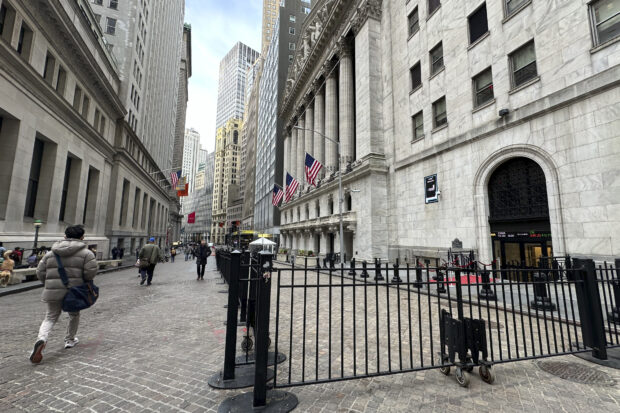Wall Street dips to send S&P 500 to its longest losing streak since Jan

People pass the New York Stock Exchange, right, on Wednesday, April 17, 2024 in New York. Global shares are trading mixed after most U.S. stocks slipped on firmer expectations that the Fed is committed to its current rate practices.(AP Photo/Peter Morgan)
NEW YORK — Sinking technology stocks sent Wall Street lower again on Wednesday, and the S&P 500 fell to its fourth straight loss.
The index dipped 29.20 points, or 0.6 percent, to 5,022.21 for its longest losing streak since early January. It’s down 4.4 percent since setting a record late last month.
The Dow Jones Industrial Average slipped 45.66 points, or 0.1 percent, to 37,753.31, and the Nasdaq composite sank 181.88, or 1.1 percent, to 15,683.37.
Tech stocks slumped after ASML, a Dutch company that’s a major supplier to the semiconductor industry, reported weaker orders for the start of 2024 than analysts expected. Its stock trading in the United States slumped 7.1 percent.
Nvidia dropped 3.9 percent, and Broadcom sank 3.5 percent to serve as the two heaviest weights on the S&P 500.
Article continues after this advertisementREAD: US stocks flat as Powell warns of longer inflation fight
Article continues after this advertisementThe tech weakness overshadowed stronger-than-expected profit reports from some big companies, including United Airlines. It soared 17.4% after reporting stronger results for the start of the year than analysts expected, lifted by strong demand from business fliers.
Easing pressure from bond market
The losses also came despite easing pressure from the bond market, which has been dictating much of Wall Street’s action lately. Sharp tumbles in oil prices lessened investors’ worries about inflation, which in turn helped Treasury yields ease.
The 10-year Treasury yield sank to 4.58 percent from 4.67 percent late Tuesday. The two-year yield, which moves more closely with expectations for the Fed, fell to 4.92 percent from 4.99 percent.
They gave back some of their big recent gains driven by traders giving up on hopes for imminent cuts to interest rates by the Federal Reserve.
Yields on Tuesday had returned to where they were in November after top officials at the Federal Reserve suggested the central bank may hold its main interest steady for a while.
It wants to get more confidence that inflation is sustainably heading toward its target of 2 percent. Its main interest rate has been sitting at its highest level since 2001.
High-interest rates hurt prices for investments and increase the risk of a recession, but Fed officials are concerned after a string of reports this year has shown inflation remaining hotter than forecast.
READ: US Fed’s Powell says inflation fight may take ‘longer than expected’
Traders are now mostly expecting just one or two cuts to interest rates from the Federal Reserve this year, according to data from CME Group. That’s down from forecasts for six or more at the start of the year.
With little near-term help expected from an easing of interest rates, companies will need to deliver fatter profits to justify their big runs in stock price since autumn.
“I think markets are waiting on corporate news to decide where they’ll head next,” said JJ Kinahan, CEO of IG North America.
Winners, losers
Travelers slumped 7.4 percent after the insurer’s quarterly results fell short of forecasts. It had to contend with more losses from catastrophes.
J.B. Hunt Transport Services fell 8.1 percent after reporting weaker revenue and results than expected. It was hurt in part by competition in the eastern part of the country and by higher wages for workers and other costs.
On the winning side of Wall Street was Omnicom Group. It rose 1.6 percent after reporting stronger profit for the latest quarter than analysts expected. The marketing and communications company highlighted growth trends in most markets around the world, outside the Middle East and Africa.
READ: Trump Media stock slides to more than 66% below its peak
The stock of Donald Trump’s social media company also continued to swing sharply, this time jumping 15.6 percent. That followed two straight losses of more than 14 percent. Experts say the stock is caught up in frenzied trading driven more by public sentiment around the former president than by the business prospects of the company.
In stock markets abroad, London’s FTSE 100 added 0.4 percent after a report showed U.K. inflation fell to its lowest level in two and a half years in March. That could further pave the way for a cut in interest rates there.
Other indexes rose modestly in Europe, while they were mixed in Asia. Japan’s Nikkei 225 fell 1.3 percent, while stocks jumped 2.1 percent in Shanghai.